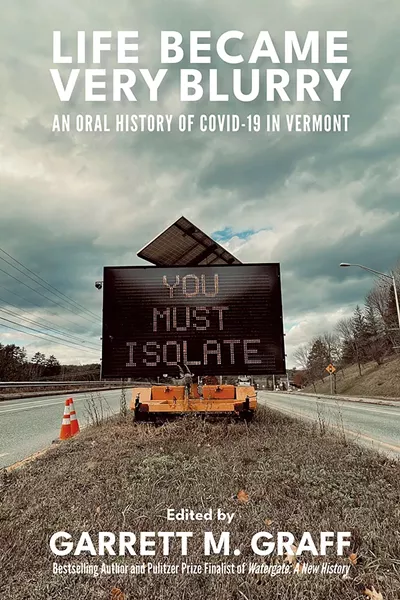One of President Donald Trump’s executive orders threatens to stop funding for the Vermont Historical Society‘s milestone COVID-19 project. The work, a three-year oral history initiative, is virtually complete. The book it produced, Life Became Very Blurry: An Oral History of COVD-19 in Vermont, hits bookstores on Tuesday, March 25, and a podcast with the same name comes out three days later.
The federal Institute of Museum and Library Services awarded the historical society a $137,000 grant over three years to help cover the $250,000 project’s cost, and the money has been spent. The agency is one of seven the president now seeks to dismantle. The historical society has yet to receive the grant’s final $30,000.
New Book Chronicles COVID-19 Oral Histories in Vermont

New Book Chronicles COVID-19 Oral Histories in Vermont
By Ken Picard
History
Normally, the nonprofit would have several more months to submit a request for the final payout, but staffers are scrambling to file it this week. “We’re worried,” project director Amanda Kay Gustin said on Tuesday.
The IMLS awarded Vermont $1.4 million in 2024. The bulk of the money, $1.2 million, went to the Vermont Department of Libraries through the Grants to States program, the largest source of federal funding support for library services in the U.S. The money accounts for a third of the department’s annual budget and supports resources shared by libraries statewide, including interlibrary loan, databases, ebooks, audiobooks and workforce development programs.
It is unclear what effect the executive order will have, state librarian and Commissioner of Libraries Catherine Delneo said in an email. According to the order, signed last Friday, it “continues the reduction in the elements of the Federal bureaucracy that the President has determined are unnecessary.” The IMLS, along with agencies that address homelessness, support minority-owned businesses and oversee the Voice of America media network, were ordered “eliminated to the maximum extent” allowed by law.
Courts have blocked other attempts by the administration to shrink the government. A federal judge on Tuesday ruled that efforts to shutter the U.S. Agency for International Development likely violated the Constitution and ordered operations to be partially restored. Two rulings last week called for agencies to rehire employees fired because they had probationary status.
The Vermont Department of Libraries and the Vermont Historical Society are among organizations nationwide swirling in uncertainties. The historical society’s COVID-19 project is the first statewide compilation of pandemic oral history.
“This is the kind of work that we know is just absolutely crucial to do,” said Gustin, the historical society’s director of collections and access.
Talking to people soon after a momentous event allows historians to record personal, intimate and emotional details that will fade over time, information essential to understanding the event and to learning from it, Gustin continued. “And this is the kind of project that is absolutely not possible without federal funding partners,” she said.
If funding is denied, “we’ll have a sizable hole in our budget,” Gustin added. “I don’t have a good answer for exactly what our next steps would be.”
A separate $180,000 grant from IMLS allowed the historical society last summer to launch a program to help the state’s 190 historical societies assess and improve their collections. The historical society has started looking for alternate funding to replace the grant money — if needed — in order to save the project and the job of its program director, Hannah Kirkpatrick, who began work in October.
Prospects now look dim for the historical society’s hope to create a digital platform — a one-stop portal — that would allow users to access historical material held in the collections of historical societies and museums around the state.
In a letter posted online and on social media, historical society executive director Stephen Perkins and president Jan Albers spelled out potential losses and expressed gratitude for members, volunteers, donations and encouragement. “We will continue to press on with our work,” they wrote.
They also encouraged support for libraries. “History is housed in libraries. Libraries hold the books that tell our stories, they have rich histories that are intertwined with our towns and villages, and often the local historical society is housed right in the library,” they wrote. “Local libraries are community hubs, where children congregate after school and older Vermonters access resources.”
The six other agencies named in last Friday’s executive order are the Federal Mediation and Concilation Service, the U.S. Agency for Global Media, the Woodrow Wilson International Center for Scholars, the U.S. Interagency Council on Homelessness, the Community Development Financial Institutions Fund, and the Minority Business Development Agency.

